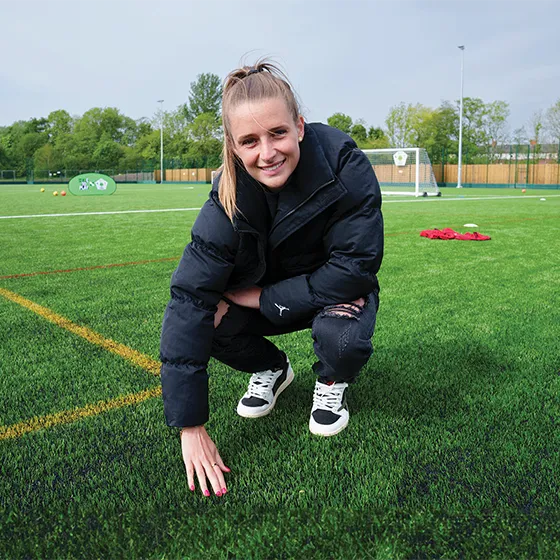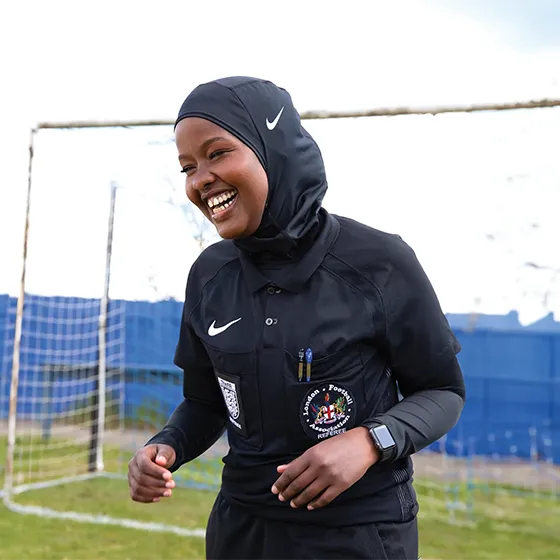01 CHAT WITH CHARITIES
Sports charities are often the first place to ask for help with fundraising. You could start with…
Access Sport improves young people’s health and wellbeing through support for sports in deprived communities. accesssport.org.uk
Street Games has extensive guidance on sources of grants and support with fundraising.streetgames.org
Sport England has links to fundraising sources and grants. sportengland.org
02 KICK-OFF WITH A REASON
Whatever the reason for starting a team – to be with friends, to help others enjoy playing a sport or to develop your skills – write out your team ethos and pin it up to remind your team of what you’re all about, especially during the tough times.
 03 REMOVE BARRIERS
03 REMOVE BARRIERS
Focus your club communications on making members feel as welcome as possible, especially those feeling nervous about the challenge of joining a new social group. Make sure you practise inclusivity.
04 A TEAM TO RUN A TEAM
Need help running your team? Checkout these great sources for volunteer help
Sport England has some great tips at sportenglandclubmatters.com
The National Council for Volunteer Organisationshas a network of accredited centres across the country. ncvo.org.uk
Do Itis the UK’s national volunteering database which connects people who want to set up clubs or teams.doit.life/volunteer
05 DO YOU HAVE TIME?
It’s hard enough to start a new team without trying to do all the jobs yourself. Ask yourself, do you really have the time to manage a team? Here are some top tips…
Talk to existing team managers about their time commitment, to get an idea of how much time you will need to put in.
Find an assistant who can take on some of the responsibilities for running a team.
Timetable your practice session each week and clear two to three hours of time for a game on every Saturday or Sunday.
06 GET AFFILIATED
Try Sport England’s Supporting Clubs resource, it’s a great starting point for help and advice on fundraising, insurance and organising your team. They can also help you contact your specific sport’s governing body – also a very useful contact as you get your club established.
07 WHERE ARE YOU GOING TO PLAY?
You may already be using a playing space that will become your new team’s home turf. But if not, it pays to know how to get access to pitches, sports halls and open spaces.
pitchfinder.org.uk lists available grass, 3G, artificial and indoor pitches, courts and playing fields closest to you.
Alternatively, type your sport – from athletics to volleyball – into the search engine at playfinder.com for sports pitches and courts in the UK and Ireland.
 08LOOK OUT FOR LAUNCH EVENTS
08LOOK OUT FOR LAUNCH EVENTS
There are plenty of ways to attract new members for your team, supporters and even potential sponsors. You can host trials, demonstrations or a tournament. Also, a great way of attracting new talent is by running an open day or creating a charity event. Make sure to mention these on social media to spread the word.
09 BRING ON TALENT
Grow your own young leaders from within your team by giving them additional responsibilities and titles, encouraging them to nurture and guide newcomers into the club. Creating these young ambassadors is a great way of keeping them involved and role-modelling for younger players. They may then help with coaching, officiating and filming games for social media.
 10 REWARD GOOD WORK
10 REWARD GOOD WORK
Your team may not finish top of the league or win the cup, but even the small successes should be celebrated and everyone at the club – from the best player to the most helpful volunteer – should be recognised, rewarded and made to feel valued.
11 GO BEYOND THE MATCH…
Look at ways of bringing your team together through social activities beyond just the match day and training. It could be a barbecue, fundraising event or night out bowling. The essential thing is to sit and talk to each other, build team spirit and in the process work out team values,goals and rules together.









